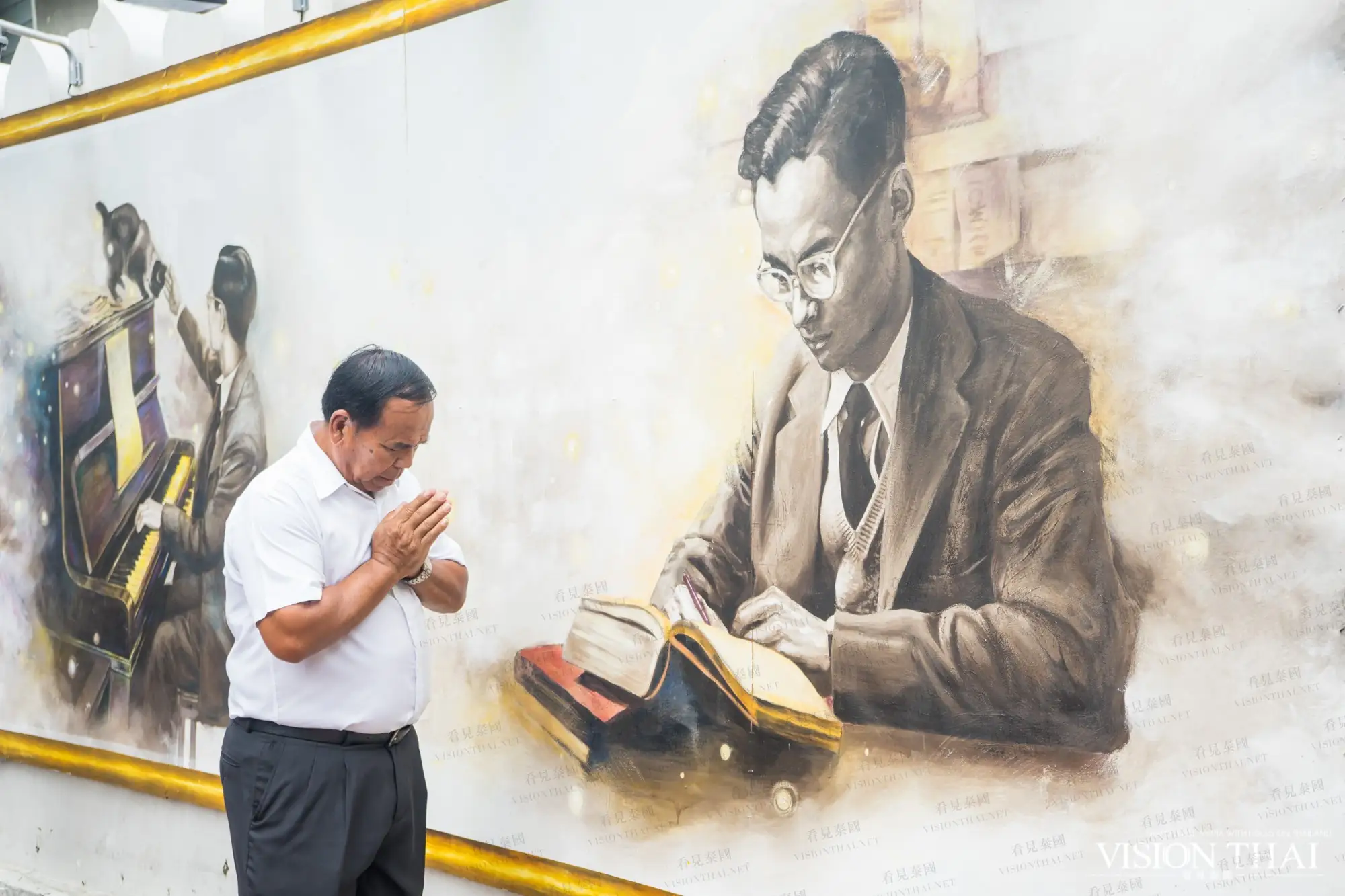泰國卻克里王朝九世蒲美蓬每國王在位超過70年,於2016年10月13日在曼谷駕崩,國王一生致力為泰國人民奮鬥改善生活,倡導永續發展及行善,精神將會永存泰國民眾的心中。
蒲美蓬國王是卻克里王朝少數出生在海外的君主,年輕時多數旅居歐洲,而皇太后的家庭教育亦融合泰國文化價值,造就國王結合西方與泰國的生活方式,包括繪畫、攝影、西樂,甚至是風帆等戶外運動,都可見到國王的身影。
年輕時的國王,偕同詩麗吉皇后出訪多國,而國王足跡也踏遍泰國各處,甚至交通中斷的地方都可見到國王搭乘直升機前往探視,國王更結合科學知識,改善農民的生活,最著名的包括泰北地區的山地計畫,鼓勵農民改種草莓、花卉等經濟作物,成功將惡名昭彰的金三角罌粟毒品掃蕩;亦結合科學技術,在東北依善地區改良土壤、進行人造雨等,泰國現在的國際糧倉地位,國王更是功不可沒。
國王深知肩負的皇室責任,畢生致力改善泰國人民的生活,泰國6700萬民眾對於蒲美蓬國王的敬愛,更將持續傳承不輟,即使國王出生在海外,對於泰國人民的熱愛及付出,更將永存民眾心中。
了解更多請參考以下泰國大使館所提供的文章
King Bhumibol Adulyadej: Thailand’s International Monarch
His Majesty King Bhumibol Adulyadej, the “Father of the Nation” to the people of Thailand who passed away on 13 October 2016, led a remarkable life filled with valuable achievements. His Majesty’s passing left an indelible influence not only on His people but also on the international community.
His Majesty was born in the United States in Cambridge, Massachusetts- being the only monarch born on US soil. Spending His formative years in Europe, mainly in Switzerland, His Majesty studied science and then politics before acceding to the throne in 1946. Despite growing up in the West, His Majesty was instilled by the Princess Mother, HRH Princess Srinakarindra, with the values and traditions of the Thai people. Thus, His Majesty’s background was a unique convergence of Western and Eastern cultures. This was reflected in His Majesty having a wider range of interests than other Thais of His generation, ranging from the arts such as music, photography and painting, sports such as sailing- to scientific inventions and innovations. His Majesty King Bhumibol was a true “Renaissance Monarch” in every aspect.
His Majesty’s grandfather, King Chulalongkorn the Great, also known as King Rama V, had guided Thailand into the modern era. The King enabled Thailand (or Siam as it was then known) to be the only country in Southeast Asia to not be struck by the wave of colonization. King Rama V achieved this by learning tactics from the West and by travelling to Europe in 1897 in order to make Siam known to the Western monarchs – to showcase them that Siam was a civilized nation and not a land of ‘barbarians’.
Early in His Reign, His Majesty King Bhumibol Adulyadej followed in the footsteps of His illustrious forebear. In less than a decade, from 1959 to 1967, His Majesty, accompanied by Her Majesty Queen Sirikit, visited 27 countries. He met with important leaders of the world, reaffirmed ties forged in Europe during the time of Rama V, addressed the US Congress, and placed a small country like Thailand firmly on the international map. Apart from merely “showing the flag”, the trips were also opportunities for His Majesty to learn the best skills and practices from developed Western nations, which He would later utilize to the benefit of the Thai people.
After that period of international travel, His Majesty returned to Thailand and never travelled abroad again. When asked why, His Majesty responded that He wanted to understand Thailand better in order to help the Thai people. For the remainder of His Reign, His Majesty travelled to all the remote corners of Thailand, no matter how underdeveloped or difficult to reach, visited all of Thailand’s provinces, and met with local residents from all walks of life – farmers, fishermen, merchants, local administrators – to listen to their views and needs. His Majesty provided technical advice to government agencies in forming solutions to help the common people, bringing about a synergy between local traditions and modern methods. During all of His domestic travels, His Majesty was invariably accompanied by Her Majesty Queen Sirikit and other Members of the Royal Family. From a young age, Members of the Thai Royal Family were instilled with Thai culture and values, including the responsibilities to the Thai people. For this reason, They continue to work until this day to help support and improve the lives of Their subjects.
His Majesty consistently maintained that Thailand is inherently an agricultural country and should never abandon its roots- repeatedly emphasising that Thailand must be able to feed itself. His Majesty therefore attached a great deal of importance in helping agriculture flourish. He applied His knowledge in sciences, mainly acquired from His previous trips abroad, to create and support over 4,000 Royal Development Projects. The Projects focused on increasing the efficiency and effectiveness of farming methods, using modern techniques such as crop substitution, water management, reversing the effects of soil erosion, along with inventions and innovations such as artificial rainmaking, the Chaipattana Aerator and generating renewable energy from palm oil- many of which received patents domestically and abroad. Ultimately, this resulted in a significant improvement in the livelihood and welfare of the majority of Thailand’s farmers.
In this holistic approach to sustainable development, His Majesty was a visionary far beyond His time. Almost every priority that the world now focuses on in the Sustainable Development Goals (SDGs), His Majesty had been advocating for and practicing for many decades. His Majesty first outlined the Sufficiency Economy Philosophy (SEP) in 1974, an approach that encourages people to live within their means and not abuse natural resources in order to increase sustainability and create resilience to external challenges. Its core principles, giving importance to living a life of moderation and applying discipline and self-control, are at the heart of sustainable development- a cause that the world now views as a priority agenda. Over the course of more than 40 years, His Majesty’s philosophy continues to be ingrained in the minds of the Thai people, particularly following the hard lessons learned from the 1997 economic crisis. Currently Thailand continues to openly share its positive experiences and promote the philosophy with the international community.
The significance that His Majesty attached to agriculture has evolved Thailand into one of the world’s leading agricultural powerhouses today. Now Thailand is not only able to feed itself; it also contributes immensely to the maintenance of global food security. Today, many of His Majesty’s inventions and innovations, such as artificial rainmaking, are increasingly being applied abroad. Such remarkable achievements that have created a positive impact on a local and global scale have earned His Majesty the recognition and accolade of “Thailand’s Development King” by the United Nations and the international community. This is a title well-deserved for His Majesty King Bhumibol Adulyadej in light of the incredible legacy He has left behind.
